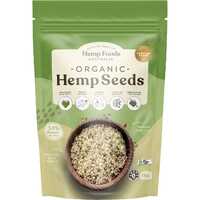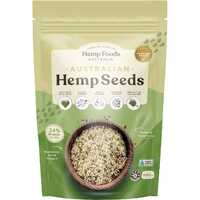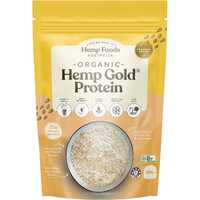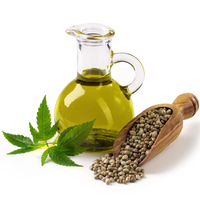Hemp Seeds: Chockers Full of Protein & Healthy Fat!
When people think of hemp, they probably think of marijuana and the intense debate over its use. Although hemp seeds are a part of the plant, Cannibis sativa, the seeds and oil contain only trace amounts of the psychoactive compound THC.
In other words, using hemp seeds and hemp seed oil for its health benefits is completely legit.
Hemp Seed Oil and Skin Health
Hemp seed oil has been shown to relieve symptoms of eczema. One study investigated the effect of dietary supplementation of hemp seed oil on participants with the skin disorder. There was a significant decrease of transepidermal water loss among participants.
Participants also reported that skin dryness and itchiness improved and that their use of skin medications decreased. The researchers believe that participants experienced these improvements as a result of the balanced and abundant supply of polyunsaturated fatty acids in hemp seed oil.
Additionally, hemp seed oil can be applied topically to support skin health. It is not greasy and is quickly absorbed by the skin. Hemp seed oil benefits include its antioxidant and anti-inflammatory properties.
But Is Hemp Really Nutritious?
Hemp seed is made up of 30-35% fat (don’t worry—good fat!) and about 25% protein. Its oil contains over 80% polyunsaturated fatty acids, which can lower LDL cholesterol as well as blood pressure.
It is an excellent source of the two essential fatty acids linoleic acid (omega-6) and alpha-linolenic acid (omega-3). The omega-6 to omega-3 ratio in hemp seed oil is typically 2:1 to 3:1. Why does this matter? An optimal ratio of these important essential fatty acids is protective against the inflammatory state, which is an underlying cause of chronic disease.
In addition to being an excellent source of omega-3 and omega-6 polyunsaturated fatty acids, hemp seeds provide high quality protein in the form of edestin and albumin, which are the two main proteins in this food. These proteins are easily digested by the body and contain significant amounts of all essential amino acids, making hemp seeds a complete protein.
Adding Hemp Seed to Your Diet
Hemp seeds have a delicious, nutty flavor. Similar to flax seeds and chia seeds they can be added to a variety of dishes. Hemp seeds are a great addition to:
- Oatmeal
- Cereal
- Salad
- Cooked grains such as rice or quinoa
- Sprinkled on smoothies
Hemp seed oil can be used as a dietary supplement but it can also be incorporated directly into your food. This highly nutritious oil has a stronger flavor than the seeds. Try adding hemp seed oil to:
- Salad dressings
- Pesto
- Smoothies
- Dips
- Sauces
You can also try drizzling it over soup, pasta, or vegetables. Get creative and let us know how you use it in your favorite recipe!
(It is important to note that hemp seed oil has a low smoke point so it is not suitable for frying. Hemps seed oil should be refrigerated and used within 8-10 weeks of opening. It can also be frozen to further extend its use.)
...and remember, qualified nutritionists at Healthy Being are available to offer further general advice to help guide you in selecting the right products. So please, feel free to contact us at anytime!
 Aminta Bullard is a Master's-trained Registered Dietitian and a regular contributor to HB Insights. She specialises in health and nutrition communications, as well as nutrition education.
Aminta Bullard is a Master's-trained Registered Dietitian and a regular contributor to HB Insights. She specialises in health and nutrition communications, as well as nutrition education.


 Certified Organic
Certified Organic Vegan Friendly
Vegan Friendly  Vegetarian
Vegetarian Organic Ingredients
Organic Ingredients Dairy Free
Dairy Free Gluten Free
Gluten Free Keto Friendly
Keto Friendly
































